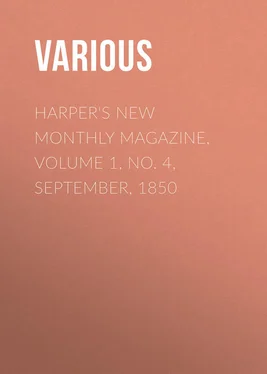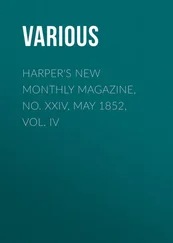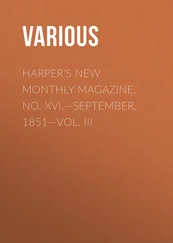Various - Harper's New Monthly Magazine, Volume 1, No. 4, September, 1850
Здесь есть возможность читать онлайн «Various - Harper's New Monthly Magazine, Volume 1, No. 4, September, 1850» — ознакомительный отрывок электронной книги совершенно бесплатно, а после прочтения отрывка купить полную версию. В некоторых случаях можно слушать аудио, скачать через торрент в формате fb2 и присутствует краткое содержание. Издательство: Иностранный паблик, Жанр: periodic, foreign_edu, на английском языке. Описание произведения, (предисловие) а так же отзывы посетителей доступны на портале библиотеки ЛибКат.
- Название:Harper's New Monthly Magazine, Volume 1, No. 4, September, 1850
- Автор:
- Издательство:Иностранный паблик
- Жанр:
- Год:неизвестен
- ISBN:нет данных
- Рейтинг книги:5 / 5. Голосов: 1
-
Избранное:Добавить в избранное
- Отзывы:
-
Ваша оценка:
- 100
- 1
- 2
- 3
- 4
- 5
Harper's New Monthly Magazine, Volume 1, No. 4, September, 1850: краткое содержание, описание и аннотация
Предлагаем к чтению аннотацию, описание, краткое содержание или предисловие (зависит от того, что написал сам автор книги «Harper's New Monthly Magazine, Volume 1, No. 4, September, 1850»). Если вы не нашли необходимую информацию о книге — напишите в комментариях, мы постараемся отыскать её.
Harper's New Monthly Magazine, Volume 1, No. 4, September, 1850 — читать онлайн ознакомительный отрывок
Ниже представлен текст книги, разбитый по страницам. Система сохранения места последней прочитанной страницы, позволяет с удобством читать онлайн бесплатно книгу «Harper's New Monthly Magazine, Volume 1, No. 4, September, 1850», без необходимости каждый раз заново искать на чём Вы остановились. Поставьте закладку, и сможете в любой момент перейти на страницу, на которой закончили чтение.
Интервал:
Закладка:
Various
Harper's New Monthly Magazine, Volume 1, No. 4, September, 1850
MEMORIES OF MISS JANE PORTER
The frequent observation of foreigners is, that in England we have few “celebrated women.” Perhaps they mean that we have few who are “notorious;” but let us admit that in either case they are right; and may we not express our belief in its being better for women and for the community that such is the case: “celebrity” rarely adds to the happiness of a woman, and almost as rarely increases her usefulness. The time and attention required to attain “celebrity,” must, except under very peculiar circumstances, interfere with the faithful discharge of those feminine duties upon which the well-doing of society depends, and which shed so pure a halo around our English homes. Within these “homes” our heroes – statesmen – philosophers – men of letters – men of genius – receive their first impressions, and the impetus to a faithful discharge of their after callings as Christian subjects of the State.
There are few of such men who do not trace back their resolution, their patriotism, their wisdom, their learning – the nourishment of all their higher aspirations – to a wise, hopeful, loving-hearted and faith-inspired mother; one who believed in a son’s destiny to be great; it may be, impelled by such belief rather by instinct than by reason; who cherished (we can find no better word), the “Hero-feeling” of devotion to what was right, though it might have been unworldly; and whose deep heart welled up perpetual love and patience, toward the over-boiling faults and frequent stumblings of a hot youth, which she felt would mellow into a fruitful manhood.
The strength and glory of England are in the keeping of the wives and mothers of its men; and when we are questioned touching our “celebrated women,” we may in general terms refer to those who have watched over, moulded, and inspired our “celebrated” men.
Happy is the country where the laws of God and nature are held in reverence – where each sex fulfills its peculiar duties, and renders its sphere a sanctuary! and surely such harmony is blessed by the Almighty – for while other nations writhe in anarchy and poverty, our own spreads wide her arms to receive all who seek protection or need repose.
But if we have few “celebrated” women, few, who impelled either by circumstances or the irrepressible restlessness of genius, go forth amid the pitfalls of publicity, and battle with the world, either as poets – or dramatists – or moralists – or mere tale-tellers in simple prose – or, more dangerous still, “hold the mirror up to nature” on the stage that mimics life – if we have but few, we have, and have had some , of whom we are justly proud; women of such well-balanced minds, that toil they ever so laboriously in their public and perilous paths, their domestic and social duties have been fulfilled with as diligent and faithful love as though the world had never been purified and enriched by the treasures of their feminine wisdom; yet this does not shake our belief, that, despite the spotless and well-earned reputations they enjoyed, the homage they received (and it has its charm), and even the blessed consciousness of having contributed to the healthful recreation, the improved morality, the diffusion of the best sort of knowledge – the woman would have been happier had she continued enshrined in the privacy of domestic love and domestic duty. She may not think this at the commencement of her career; and at its termination, if she has lived sufficiently long to have descended, even gracefully from her pedestal, she may often recall the homage of the past to make up for its lack in the present . But so perfectly is woman constituted for the cares, the affections, the duties – the blessed duties of un -public life – that if she give nature way it will whisper to her a text that “celebrity never added to the happiness of a true woman.” She must look for her happiness to home. We would have young women ponder over this, and watch carefully, ere the vail is lifted, and the hard cruel eye of public criticism fixed upon them. No profession is pastime; still less so now than ever, when so many people are “clever,” though so few are great. We would pray those especially who direct their thoughts to literature, to think of what they have to say, and why they wish to say it; and above all, to weigh what they may expect from a capricious public, against the blessed shelter and pure harmonies of private life. 1 1 In support of this opinion, which we know is opposed to the popular feeling of many in the present day, we venture to quote what Miss Porter herself repeats, as said to her by Madame de Stael: “She frequently praised my revered mother for the retired manner in which she maintained her little domestic establishment, yielding her daughters to society, but not to the world .” We pray those we love, to mark the delicate and most true distinction, between “society” and the “world.” “I was set on a stage,” continued De Stael, “I was set on a stage, at a child’s age, to be listened to as a wit and worshiped for my premature judgment. I drank adulation as my soul’s nourishment, and I cannot now live without its poison; it has been my bane , never an aliment. My heart ever sighed for happiness, and I ever lost it, when I thought it approaching my grasp. I was admired, made an idol, but never beloved . I do not accuse my parents for having made this mistake, but I have not repeated it in my Albertine” (her daughter.) “She shall not ‘Seek for love, and fill her arms with bays.’ I bring her up in the best society, yet in the shade.”
But we have had some – and still have some – “celebrated” women of whom we have said “we may be justly proud.” We have done pilgrimage to the shrine of Lady Rachel Russell, who was so thoroughly “domestic” that the Corinthian beauty of her character would never have been matter of history, but for the wickedness of a bad king. We have recorded the hours spent with Hannah More; the happy days passed with, and the years invigorated by Maria Edgeworth. We might recall the stern and faithful puritanism of Maria Jane Jewsbury; and the Old World devotion of the true and high-souled daughter of Israel – Grace Aguilar. The mellow tones of Felicia Heman’s poetry linger still among all who appreciate the holy sympathies of religion and virtue. We could dwell long and profitably on the enduring patience and life-long labor of Barbara Hofland, and steep a diamond in tears to record the memories of L.E.L. We could – alas, alas! barely five-and-twenty years’ acquaintance with literature and its ornaments, and the brilliant catalogue is but a Momento Mori ! Perhaps of all this list, Maria Edgworth’s life was the happiest; simply because she was the most retired, the least exposed to the gaze and observation of the world, the most occupied by loving duties toward the most united circle of old and young we ever saw assembled in one happy home.
The very young have never, perhaps read one of the tales of a lady whose reputation, as a novelist, was in its zenith when Walter Scott published his first novel. We desire to place a chaplet upon the grave of a woman once “celebrated” all over the known world; yet who drew all her happiness from the lovingness of home and friends, while her life was as pure as her renown was extensive.
In our own childhood romance reading was prohibited, but earnest entreaty procured an exception in favor of the “Scottish Chiefs.” It was the bright summer, and we read it by moonlight, only disturbed by the murmur of the distant ocean. We read it, crouched in the deep recess of the nursery window; we read it until moonlight and morning met, and the breakfast bell ringing out into the soft air from the old gable, found us at the end of the fourth volume. Dear old times! when it would have been deemed little less than sacrilege to crush a respectable romance into a shilling volume, and our mammas considered only a five volume story curtailed of its just proportions.
Читать дальшеИнтервал:
Закладка:
Похожие книги на «Harper's New Monthly Magazine, Volume 1, No. 4, September, 1850»
Представляем Вашему вниманию похожие книги на «Harper's New Monthly Magazine, Volume 1, No. 4, September, 1850» списком для выбора. Мы отобрали схожую по названию и смыслу литературу в надежде предоставить читателям больше вариантов отыскать новые, интересные, ещё непрочитанные произведения.
Обсуждение, отзывы о книге «Harper's New Monthly Magazine, Volume 1, No. 4, September, 1850» и просто собственные мнения читателей. Оставьте ваши комментарии, напишите, что Вы думаете о произведении, его смысле или главных героях. Укажите что конкретно понравилось, а что нет, и почему Вы так считаете.












